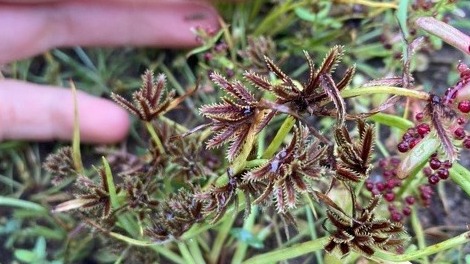Botanists assessing recently flooded river land in Victoria's north-west have rediscovered a small plant species listed as extinct in Victoria.
Cyperus squarrosus, also known as Bearded Flat Sedge, had been listed as extinct in Victoria for more than 60 years with its last verified sighting in 1953.
Botanists from the Department of Energy, Environment and Climate Action's (DEECA) Victorian Forest Monitoring Program discovered a significant population of the species while inspecting plots of public land close to the Murray River during last year's floods.
Bearded Flat Sedge is a small, tufted plant which can grow to 16 centimetres tall and is suited to wet and muddy environments including disturbed soil in floodplains.

Before confirming the discovery, botanists sent samples of the rediscovered plant population to Royal Botanical Gardens Victoria (RBGV) to compare with the last verified specimen of the plant held in the State Botanical Collection.
Now verified, the sample has been added to the RBGV collection regarded as one of Australia's most valuable biological research repositories and one of the largest in the southern hemisphere comprising of more than 1.5 million dried plant, algae and fungi specimens.
Arrangements are currently being made for ongoing management of the plant to ensure its survival for years to come.
DEECA Chief Biodiversity Officer James Todd said many of our native plants particularly grasses and sedges are vulnerable to grazing and weed invasion, yet they are critical to the health of the landscape.
"This is a heartening discovery and shows the great resilience of the species."
Victoria is the only state in Australia to have a dedicated and permanent Forest Monitoring Program.
Information collected by the program across 803 different ground plots is published in the State of the Forests Report and helps to develop policy around fire and flood impacts, habitat protection, forest productivity and biodiversity.






